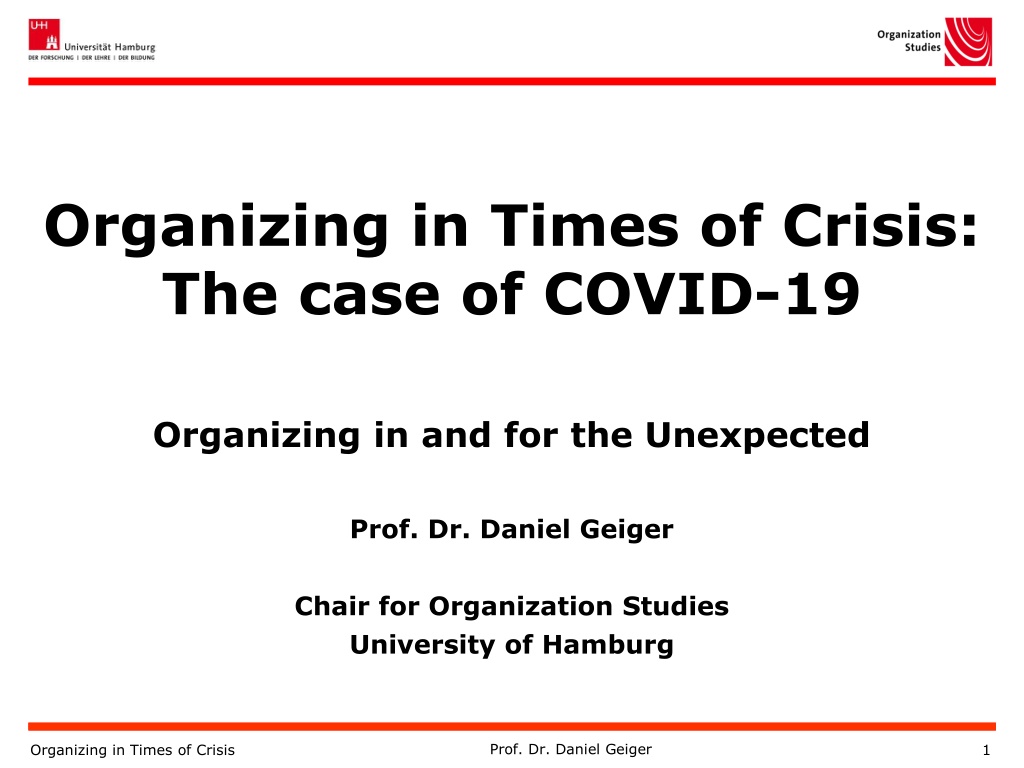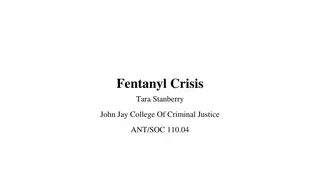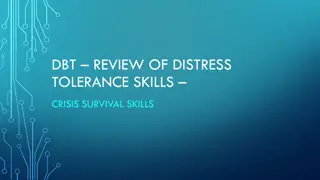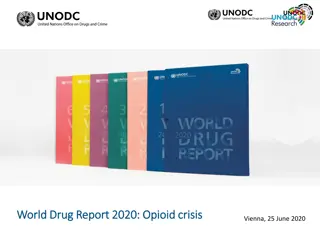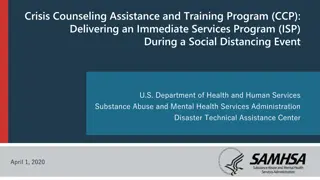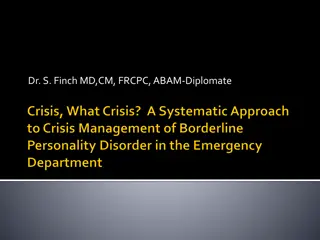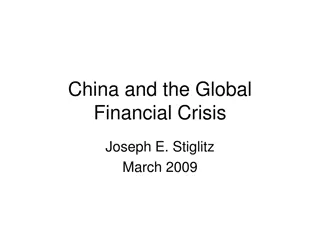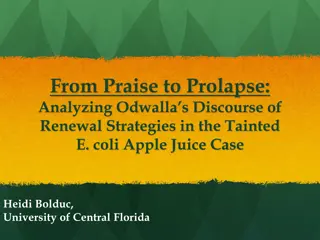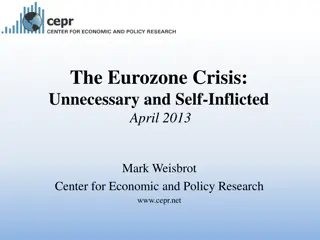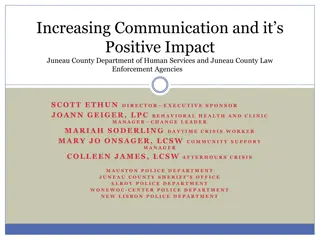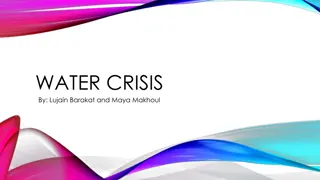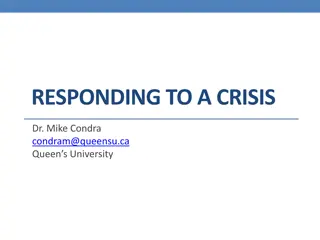Organizing in Times of Crisis: Strategies for Managing the Unexpected
Explore the innovative strategies proposed by Prof. Dr. Daniel Geiger on organizing in times of crisis, focusing on preparing organizations to effectively deal with unexpected events like the COVID-19 pandemic. The content delves into the phases of crisis unfolding, managing the tension between stability and flexibility, the role of routines, improvisation, and rule-breaking in crisis management, as well as the shift from crisis prevention to expecting the unexpected. It emphasizes the need for organizations to embrace complexity and uncertainty, highlighting the importance of acting flexibly and maintaining routines in chaotic phases.
Download Presentation

Please find below an Image/Link to download the presentation.
The content on the website is provided AS IS for your information and personal use only. It may not be sold, licensed, or shared on other websites without obtaining consent from the author. Download presentation by click this link. If you encounter any issues during the download, it is possible that the publisher has removed the file from their server.
E N D
Presentation Transcript
Institut fr Organisation Organizing in Times of Crisis: The case of COVID-19 Organizing in and for the Unexpected Prof. Dr. Daniel Geiger Chair for Organization Studies University of Hamburg Prof. Dr. Daniel Geiger Organizing in Times of Crisis 1
Institut fr Organisation What to Expect Guidung question: How can organizations be designed to routinely deal with the Unexpected? Learn about: Crisis unfold in different phases Managing the tension between stability and flexibility in responding to unexpected events The role of routines, improvisation, and roles in managing the Unexpected Rules and Rule-breaking in addressing unexpected events Prof. Dr. Daniel Geiger Organizing in Times of Crisis 2
Institut fr Organisation From Crisis prevention to Managing the Unexpected Traditional understanding: Crisis prevention Unexpected events need to be avoided at all costs Better planning, more information, sophisticated forecasting are key Internal operations: reliable routines and procedures External: better environmental scanning, more insights Unexpected: lack of knowledge, planning failure New paradigm: Expecting the Unexpected Unexpected events cannot be avoided: environment and organization are complex (normal accident theory) Reversing the question: instead of: how the Unexpected be avoided, how can we manage the Unexpected Grand Challenges: problems are complex, uncertain, evaluative (Ferraro et al. 2015) Prof. Dr. Daniel Geiger Organizing in Times of Crisis 3
Institut fr Organisation Crisis unfold in phases (adapted from Darkow 2019) Expect the Unexpected The Normal Anticipation phase The New Normal Anticipation phase Chaos phase Containment phase Chaos phase Roll-out response structures Reduce complexity Slowing-down Containment phase Act flexibly on the basis of learned routines Improvisation Role-switiching Rule-breaking Prof. Dr. Daniel Geiger Organizing in Times of Crisis 4
Institut fr Organisation Chaos Phase (adapted from Danner-Schr der/Geiger 2016) Establishing structures Fast prioritizing on the basis of routines (e.g. triage) Focus: avoid destructions, active overseeing Reduce complexity: first get ready to act before acting Non-acting as a key action each catastrophe is different, but we always approach it in similar ways (first responder THW) Keep routines on track as key focus Reduce complexity Prof. Dr. Daniel Geiger Organizing in Times of Crisis 5
Institut fr Organisation Containment Phase (adapted from Bechky/Okhuysen 2011 & Danner- Schr der/Geiger 2016) Act flexible on the basis of learnt routines Disentagle existing routines into discret chunks Flexible re-combination of these chunks to adapt to varying circumstances Improvisation as key capability Use whatever tools at hand (bricolage) Variety of skill-sets needed Swift switching of roles Response teams switch roles as situation demands Swift switch between different tasks Prof. Dr. Daniel Geiger Organizing in Times of Crisis 6
Institut fr Organisation Containment Phase (adapted from Bechky/Okhuysen 2011) Preconditions: Broadly shared knowledge base: generalist approach and intensive training Leadership: authority migration to front-line: decisions are made where the problems occur Non-hierarchical coordination on the front-line Prof. Dr. Daniel Geiger Organizing in Times of Crisis 7
Institut fr Organisation Containment Phase (Faraj/Xiao 2006: 1159) Rules and Rule-breaking Prof. Dr. Daniel Geiger Organizing in Times of Crisis 8
Institut fr Organisation Containment Phase Bureaucratic Rules Rules as necessary guidelines (protocols) for dealing with the Unexpected Rules are defined to fit specific (expected) situations To be actionable in novel situations, rule-breaking is inevitable Bureaucratic Rule breaking Who is entitled to break rules? When (under what circumstances) is rule breaking tolerated? How is an erosion of rules prevented? The case of practical illegal behavior Rule breaking leads to success At the time of rule-breaking its successfulness is uncertain Prof. Dr. Daniel Geiger Organizing in Times of Crisis 9
Institut fr Organisation Ability to contain crisis (High-reliable organizing) (adapted from Weick/Sutcliffe 2007) Pre-occupation with failure Delegation of decision-making to experts sensitive on operations Learning, fast communication is key Do not oversimplify Prof. Dr. Daniel Geiger Organizing in Times of Crisis 10
Institut fr Organisation To Summarize Expecting the Unexpected as Key Unexpected events may turn into crisis: Crisis unfold in phases Each phase demands distinct approaches Chaos phase Containment phase Learn how to accept the Unexpected: structure over strategy Prof. Dr. Daniel Geiger Organizing in Times of Crisis 11
Institut fr Organisation Contact Prof. Dr. Daniel Geiger Professor for Organization Studies University of Hamburg Mail: daniel.geiger@uni-hamburg.de Twitter: @Org_Studies Prof. Dr. Daniel Geiger Organizing in Times of Crisis 12
Institut fr Organisation References Bechky, B. A., & Okhuysen, G. A. 2011. Expecting the unexpected? How SWAT officers and film crews handle surprises. Academy of Management Journal, 54(2): 239-262. Danner-Schr der, A., & Geiger, D. 2016. Unravelling the motor of patterning work: Toward an understanding of the micro-level dynamics of standardization and flexibility. Organization Science, 27(3): 633-658. Darkow, P. M. 2019. Beyond bouncing back : Towards an integral, capability based understanding of organizational resilience. Journal of Contingencies and Crisis Management, 27(2): 145-156. Faraj, S., & Xiao, Y. 2006. Coordination in fast-response organizations. Management Science, 52(8): 1155-1169. Ferraro, F., Etzion, D., & Gehman, J. 2015. Tackling grand challenges pragmatically: Robust action revisited. Organization Studies, 36(3): 363-390. Geiger, D., Danner-Schr der, A., & Kremser, W. 2020. Getting Ahead of Time Performing Temporal Boundaries to Coordinate Routines Under Temporal Uncertainty. Administrative Science Quarterly, forthcoming. Weick, K. E., & Sutcliffe, K. M. 2007. Managing the unexpected : Resilient performance in an age of uncertainty (2nd ed.). San Francisco: Jossey-Bass. Prof. Dr. Daniel Geiger Organizing in Times of Crisis 13
